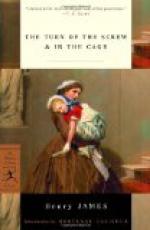of wreckage. But it contributed hugely at present
to carry on the two parallel lines of her experience
in the cage and her experience out of it. After
keeping quiet for some time about this opposition
she suddenly—one Sunday afternoon on a penny
chair in the Regent’s Park—broke,
for him, capriciously, bewilderingly, into an intimation
of what it came to. He had naturally pressed
more and more on the point of her again placing herself
where he could see her hourly, and for her to recognise
that she had as yet given him no sane reason for delay
he had small need to describe himself as unable to
make out what she was up to. As if, with her
absurd bad reasons, she could have begun to tell him!
Sometimes she thought it would be amusing to let him
have them full in the face, for she felt she should
die of him unless she once in a while stupefied him;
and sometimes she thought it would be disgusting and
perhaps even fatal. She liked him, however, to
think her silly, for that gave her the margin which
at the best she would always require; and the only
difficulty about this was that he hadn’t enough
imagination to oblige her. It produced none the
less something of the desired effect—to
leave him simply wondering why, over the matter of
their reunion, she didn’t yield to his arguments.
Then at last, simply as if by accident and out of
mere boredom on a day that was rather flat, she preposterously
produced her own. “Well, wait a bit.
Where I am I still see things.” And she
talked to him even worse, if possible, than she had
talked to Jordan.
Little by little, to her own stupefaction, she caught
that he was trying to take it as she meant it and
that he was neither astonished nor angry. Oh
the British tradesman—this gave her an idea
of his resources! Mr. Mudge would be angry only
with a person who, like the drunken soldier in the
shop, should have an unfavourable effect on business.
He seemed positively to enter, for the time and without
the faintest flash of irony or ripple of laughter,
into the whimsical grounds of her enjoyment of Cocker’s
custom, and instantly to be casting up whatever it
might, as Mrs. Jordan had said, lead to. What
he had in mind was not of course what Mrs. Jordan
had had: it was obviously not a source of speculation
with him that his sweetheart might pick up a husband.
She could see perfectly that this was not for a moment
even what he supposed she herself dreamed of.
What she had done was simply to give his sensibility
another push into the dim vast of trade. In that
direction it was all alert, and she had whisked before
it the mild fragrance of a “connexion.”
That was the most he could see in any account of her
keeping in, on whatever roundabout lines, with the
gentry; and when, getting to the bottom of this, she
quickly proceeded to show him the kind of eye she
turned on such people and to give him a sketch of what
that eye discovered, she reduced him to the particular
prostration in which he could still be amusing to
her.




